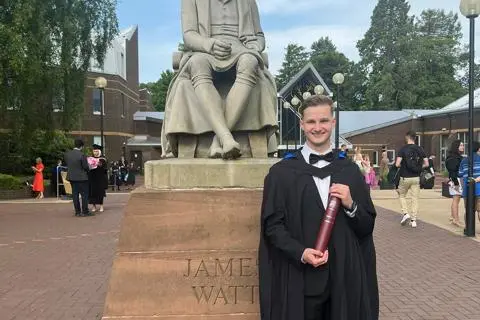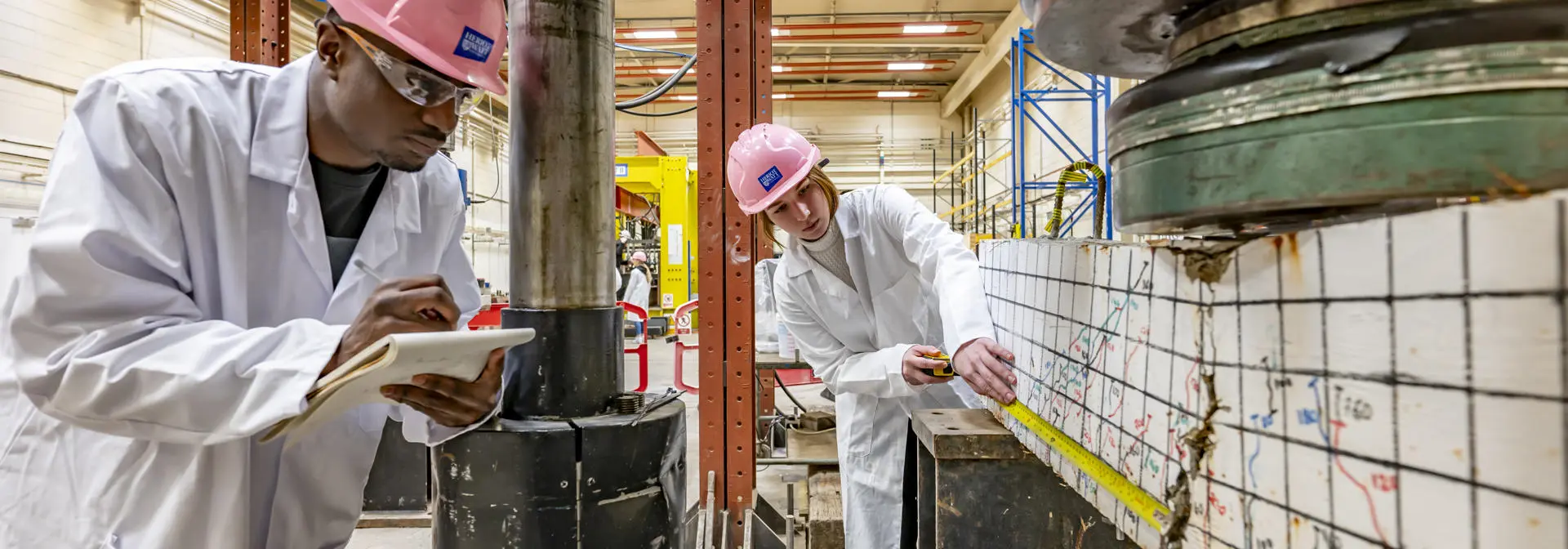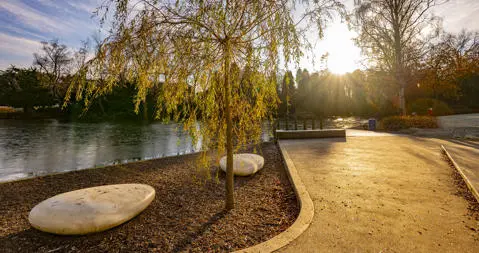Key information
Heriot-Watt University was ranked 1st in the UK for Building by the Times and The Sunday Times Good University Guide 2026. Develop the skills and expertise to design essential infrastructure that shapes and supports modern society with the BEng Civil Engineering.
- UCAS code
- H201
- Level
- Undergraduate
- Delivery type
- Full Time
- Degree qualification
- MEng
- Mode of delivery
- On-Campus
- Duration
- 4-5 years
- Location
- Edinburgh
- Start date
- September
MEng Civil Engineering covers materials, structures, geotechnics, water engineering, and transportation engineering, and will provide you with the key skills and knowledge required to become a professional civil engineer working in industry.
You’ll concentrate on analysis and behaviours of materials in the early years of the degree, with a focus on design and management as you progress through your studies.
Your personal development within a professional environment will be supported and developed throughout your studies to ensure you gain the core technical skills and personal qualities required to strive within the dynamic built environment industry at the highest possible technical level.
Your student experience
Your learning will be informed by the expertise of our research-active civil and structural engineers, construction professionals, industry-leaders, and academics.
96% of Heriot-Watt University’s engineering research was classed as world-leading in the REF 2021 review, which ranked us 1st in Scotland and 3rd in the UK for engineering research through a joint submission with the University of Edinburgh.
Our MEng Civil Engineering programme is directly informed by the world class research carried out by Heriot-Watt’s Institute of Sustainable Built Environment (ISBE) which sits within the School of Energy, Geoscience, Infrastructure and Society (EGIS). EGIS is one of the United Kingdom’s leading institutions for multidisciplinary research and teaching in areas critical to economic development and societal equity. The institute’s academic team conduct high-value and high-impact research on fields covering sustainability, digital innovation, design, and management of the built environment. The research relevance of this undergraduate programme ensures your studies remain innovative and industry focused.
This School is also part of the Centre of Excellence in Sustainable Building Design, a leading body recognised by the Royal Academy of Engineering. The Centre is one of only four such centres established at United Kingdom universities that jointly form a national network to demonstrate and exchange best practice in teaching and research for the sustainable built environment.
Go Global
With Go Global, Heriot-Watt's global student programme, you can carry your studies to new places and experience new cultures, expanding your horizons on the way. You'll discover what it means to be a true global citizen and emerge prepared for wherever your career journey will take you.
European Exchange
Worldwide Exchange
Inter-Campus Transfer: Dubai
Inter-Campus Transfer: Malaysia
Course content
September Intake - Edinburgh
Year 1
Mandatory September
- Mechanics A
- Construction Technology: Small Scale Buildings
- Shaping Tomorrow Together A
- Mathematics for Engineers and Scientists 1
Mandatory January
- Mechanics B
- Building Services Technology
- Shaping Tomorrow Together B
- Mathematics for Engineers and Scientists 2
Year 2
Mandatory September
- Analysis of Determinate Structures
- Hydraulics and Hydrology A
- Surveying and GIS
- Mathematics for Engineers and Scientists 3
Mandatory January
- Design Studies A-Problem Solving
- Civil Engineering Materials
- Stress Analysis and Element Strength
- Statistics for Science
Year 3
Mandatory September
- Geology and Soil Properties
- Indeterminate Structures
- Design of Steel Elements
- Transportation Systems Planning
Mandatory January
- Design of Concrete Elements
- Environmental Technology and Management
- Geotechnics A - Introduction to Soil Mechanics
- Hydraulics & Hydrology B
Year 4
Optional September
- Sustainability for Construction Professionals
- Structural Element Design
- Catchment Flood Management
- Finite Element Method Linear Analysis
- Dissertation (Civil and Architectural Engineering)
- Exchange 1 (Design Component)
- Exchange 1 (Technical Component)
- Geotechnics B- Geotechnical Applications
Optional January
- Plastic Analysis of Structures
- Innovation in Construction Practice
- Water and Wastewater Treatment
- Urban Drainage Design and Analysis
- Energy and Buildings
- Machine Learning and Programming
- Dissertation (Civil and Architectural Engineering)
- Exchange 2 (Design Component)
- Sustainable and Intelligent Buildings
- Civil Engineering Design Project
- Exchange 2 (Technical Component)
- Foundation Engineering
Optional AY
Year 5
Mandatory September
- Civil Engineering Professional Design Project 1
Optional September
- Advanced Design Of Reinforced Concrete Structures
- Structural Dynamics and Earthquake Engineering
- Structural Materials
- Climate Change, Sustainability and Adaptation
- Project Management: Theory and Practice
- Value and Risk Management
Optional January
- Design of Low Carbon Buildings
- Advanced Design Of Steel And Steel-Concrete Composite Structures
- Environmental Planning
- Project Management: Strategic Issues
- Finite Element Method Nonlinear Analysis
- Safety, Risk and Reliability
- Water and Wastewater Treatment
- Construction Financial Management
- Civil Engineering Professional Design Project 2
Disclaimer
The courses mentioned above may change between now and the time that you study. For more information, please view our Terms and Conditions.
Programme Video
Study BEng (Hons) or MEng Civil Engineering at Heriot-Watt University
Built Environment at Heriot-Watt University
Student testimonials

Euan's story
Civil Engineering MEng
Euan, from France, graduated from Civil Engineering in 2025. Moving from France to Edinburgh was a big leap into the unknown for Euan, which was made more complicated with the pandemic coinciding with the start of his studies.See more

Bradley's story
Graduate, Civil Engineering MEng
Bradley graduated from MEng Civil Engineering in 2024. Being a mature student and not touching academia for a period of time, Bradley found himself nervous before joining the university, but instead found himself achieving awards, travelling to other countries and making friends worldwide.See more
See moreI studied MEng Civil Engineering because I enjoyed studying mathematics and graphic communication in high school, having taken part in a summer internship with structural engineering consultants, which confirmed my love of the subject. My most memorable moments would be experiencing the culture and working alongside many different people from a range of backgrounds. It helped me grow as an individual as well as within my work.
Fees and funding
| Status | Fee |
|---|---|
| Scotland | Paid by SAAS |
| England / Wales / N Ireland / Rep of Ireland | £9,790 |
| International | £25,808 |
- Status: Your residency status is usually defined as the country where you have been ordinarily resident for the three years before the start of your course.
- International: 'International' includes applicants from European Union countries who do not hold Pre-Settled or Settled status in UK. (This does not include students from the Republic of Ireland - see above).
Scholarships and bursaries
Bursaries for students from England, Northern Ireland or Wales
In addition to government loans and grants towards the costs of fees and living costs, we are offering generous financial support to attract and support eligible undergraduate students from England, Northern Ireland or Wales:
- Heriot-Watt University Bursary (up to £3,100 per year)
Entry requirements
We have standard entry requirements for all of our courses that you will have to meet.
Year 1
Standard entry requirements
- Highers AABB (over two sittings). Must include Maths achieved at B.
- A-Levels BBC. Must include Maths achieved at B.
- International Baccalaureate 30 points. Must include Maths achieved at Higher Level 5.
- BTEC Extended Diploma DMM. Must be in an engineering relevant subject and contain sufficient Maths.
- HNC B in graded unit. Must be in an engineering relevant subject and contain sufficient Maths at SCQF Level 6.
Please check that you meet our University-wide National 5/GCSE (or equivalent) English and Maths requirements.
Minimum entry requirements *
- Highers BBBC (over two sittings). Must include Maths achieved at B.
- A-Levels BCC. Must include Maths achieved at B.
- International Baccalaureate 30 points. Must include Maths achieved at Higher Level 5.
- BTEC Extended Diploma DMM. Must be in an engineering relevant subject and contain sufficient Maths.
- HNC B in graded unit. Must be in an engineering relevant subject and contain sufficient Maths at SCQF Level 6.
* Minimum: under our Fair Access Policy, we will relax our standard entry requirements for some Scottish and Rest of UK status students depending on their circumstances. Our minimum requirements will apply if you:
- live in an area within the Scottish Index of Multiple Deprivation lowest 20% (SIMD20) or POLAR4 Quintile 1 regions (RUK)
- or are care experienced.
We can also make exceptions for some Scottish students with grades above minimum but below standard. Read more about our Minimum and standard entry requirements.
Year 2
- Advanced Highers BB including Maths, plus Highers AABB.
- A-Levels BBB including Maths.
- International Baccalaureate 35 points. Must include Maths achieved at Higher Level 6.
- BTEC Extended Diploma DDM. Must be in an engineering relevant subject and contain sufficient Maths.
- HNC A in graded unit. Must be in an engineering relevant subject and contain sufficient Maths at SCQF Level 7.
- HND BB in graded units. Must be in an engineering relevant subject and contain sufficient Maths at SCQF Level 7.
- Global College: Successful completion of our Engineering with Foundation
Year 3
- HND AB / BA in graded units. HND must contain sufficient Maths at SCQF Level 7 and be in an engineering relevant subject area.
Additional information
- For all years, applications are welcomed from holders of non-school qualifications, mature candidates and overseas students.
- If you do not see your qualifications here please contact us at studywithus@hw.ac.uk
- For applicants studying HNC, HND or BTEC qualifications, when submitting your application please ensure you list in full all the units you are currently studying, as specific units (e.g. in Maths) may be required.
- Examples of a relevant HNC or HND engineering subject may include Construction, Civil Engineering, Built Environment or Engineering Systems.
English language requirements
If your first language is not English, we'll need to see evidence of your English language ability.
The minimum English language requirement for entry to this programme is IELTS 6.0 (or equivalent) with no score lower than 5.5.
If you do not have IELTS 6.0, we offer a range of English language courses to help you meet the English language requirement for this programme prior to commencing your studies.
Please see our detailed English language requirements.
Why Heriot-Watt
We're the top university in Scotland for graduate outcomes which means that more of our graduates are employed or in postgraduate education than any other institution in the country and we ranked 5th in the UK.
We're also rated number one in the UK for CEO or MD roles, meaning more of our graduates go on to become CEOs or MDs than any other university in the whole of the UK. On top of that, we have beautiful campuses, across the globe, so you'll get a truly international education. Our Edinburgh Campus is home to Oriam, Scotland's National Sports Performance Centre combined with plenty of wellbeing resources, prioritising fitness and mental health for all students. Our Global Research Institutes look at solving real world issues such as climate change and saving our oceans as well as working on the next medical technological breakthrough and the future of AI and robots.
Employability
Work and study
Salary
Potential career paths
- Engineering professionals
Student life
Explore facilities, and chat to staff and students
Discover Uni course data
Discover Uni provides data on each university's degree courses across a range of measures including student satisfaction, graduate jobs and salaries.








